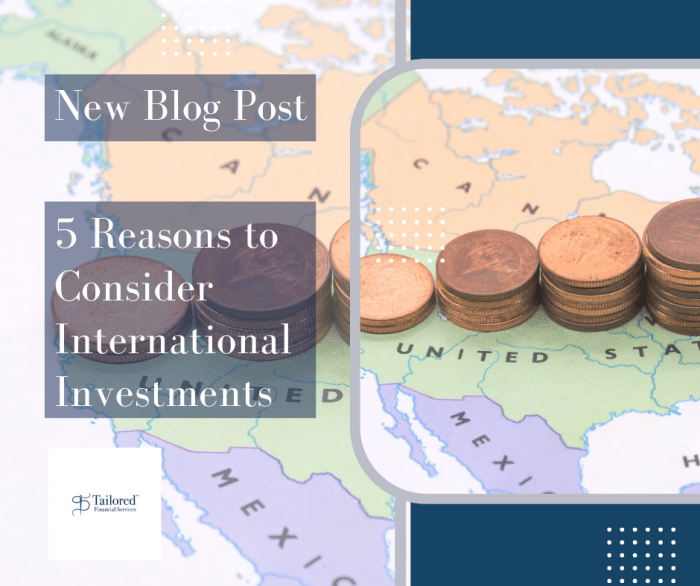Diving into the realm of international investments, we’re about to embark on a journey that explores the ins and outs of this global financial landscape. Get ready to uncover the secrets of international investments in a way that’s fresh, engaging, and totally rad.
As we delve deeper, we’ll uncover the various types of international investments, understand their significance in today’s interconnected world, and discover the strategies that savvy investors use to navigate this complex terrain.
Overview of International Investments
International investments refer to the process of investing in assets located in different countries outside of one’s own. This can include stocks, bonds, real estate, and other financial instruments.
Types of International Investments
- Foreign Direct Investment (FDI): This involves acquiring a significant ownership stake in a foreign company, giving the investor control over the operations and management of the business.
- Portfolio Investment: This includes investing in stocks, bonds, and other financial assets of foreign companies without gaining control over the operations.
- Real Estate Investments: Purchasing property in a foreign country for rental income or capital appreciation.
- Mutual Funds and Exchange-Traded Funds (ETFs): Investing in funds that hold a diversified portfolio of international securities.
Importance of International Investments in the Global Economy
International investments play a crucial role in today’s global economy for several reasons:
- Portfolio Diversification: Investing internationally helps spread risk across different markets and asset classes, reducing the impact of potential economic downturns in any single country.
- Access to Growth Opportunities: Investing in emerging markets can provide access to higher growth potential compared to developed markets.
- Enhanced Returns: International investments can offer higher returns due to differences in economic cycles, interest rates, and currency valuations.
- Geopolitical Risk Mitigation: Diversifying internationally can help mitigate geopolitical risks that may impact a single market or country.
Factors Influencing International Investments
International investment decisions are influenced by a variety of factors that impact the potential return and risk associated with investing in foreign markets. These factors can range from economic conditions to political stability, and understanding them is crucial for making informed investment choices.
Key Factors Driving International Investment Decisions
International investment decisions are often driven by factors such as:
- Economic growth potential in the target market
- Market size and consumer demographics
- Regulatory environment and ease of doing business
- Access to natural resources or technology
- Exchange rate volatility and currency risk
Risks Associated with International Investments vs. Domestic Investments
When comparing international investments to domestic investments, it’s important to consider the following risks:
- Political instability and regulatory changes in foreign markets
- Exchange rate fluctuations impacting returns
- Cultural differences and market volatility
- Lack of transparency and legal protection in certain countries
Impact of Political Stability and Economic Conditions
Political stability and economic conditions play a crucial role in shaping international investment choices. Investors often prefer countries with stable governments and strong economic fundamentals due to:
- Reduced risk of expropriation or political turmoil affecting investments
- Positive economic indicators signaling growth opportunities
- Improved investor confidence and access to capital markets
Strategies for International Investments

Investors utilize various strategies when venturing into international markets to maximize returns and mitigate risks. Diversification, thorough research, and strategic planning are key components in achieving success in international investments.
Diversification in International Investment Portfolios
Diversification plays a crucial role in international investment portfolios by spreading out investments across different countries, industries, and asset classes. This strategy helps reduce the overall risk exposure of the portfolio, as losses in one area may be offset by gains in another. By diversifying internationally, investors can also benefit from opportunities in rapidly growing economies and gain exposure to different currencies, further enhancing portfolio resilience.
Thorough Research in International Investment Decisions
Conducting comprehensive research before making international investment decisions is paramount. This includes analyzing economic indicators, political stability, regulatory environment, and market trends in the target country. Understanding cultural nuances, legal frameworks, and potential risks is essential for making informed investment choices. By leveraging market intelligence and expert insights, investors can navigate complexities and capitalize on opportunities in international markets effectively.
Impact of International Investments
International investments play a crucial role in contributing to global economic growth by facilitating the flow of capital across borders, creating opportunities for businesses to expand and innovate, and promoting economic development in various countries.
Contribution to Global Economic Growth
International investments help stimulate economic growth by attracting foreign capital, technology, and expertise to countries in need of development. This influx of resources can boost productivity, create jobs, improve infrastructure, and drive innovation, leading to overall economic prosperity.
Benefits and Challenges
- Benefits:
- Increased access to capital for businesses.
- Transfer of technology and knowledge across borders.
- Diversification of investment portfolios.
- Creation of employment opportunities.
- Challenges:
- Risk of political instability and regulatory changes.
- Cultural differences and language barriers.
- Exchange rate fluctuations and market volatility.
- Potential for exploitation of labor and resources.
Fostering Cross-Border Collaborations
International investments play a key role in fostering cross-border collaborations and partnerships by bringing together businesses, governments, and organizations from different countries to work towards common goals. These collaborations can lead to knowledge sharing, technology transfer, cultural exchange, and the creation of global networks that benefit all parties involved.
